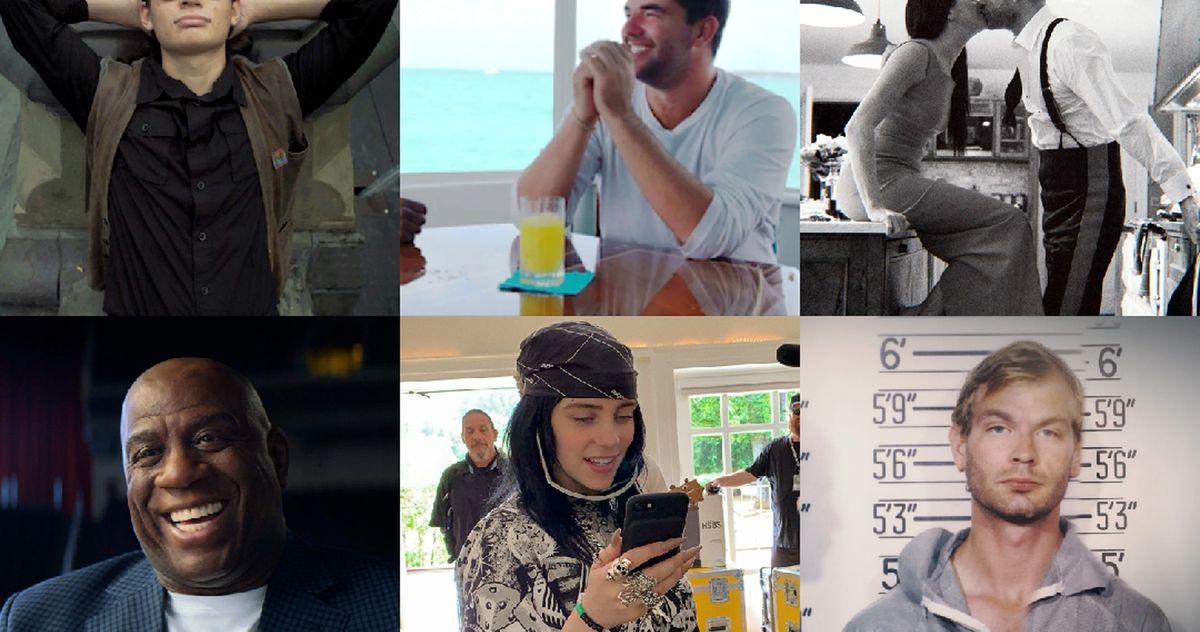
Reality Check
This article was featured in One Great Story, New York’s reading recommendation newsletter. Sign up here to get it nightly.
When Dan Cogan co-founded Impact Partners in 2007 with the goal of making good documentaries that also did good for the world, it was the beginning of what he and others now look back on as the golden age of the form. After decades of relegation to art houses and public television, films like An Inconvenient Truth, Super Size Me, and anything by Michael Moore were suddenly finding an audience and making money. The returns were modest by Hollywood standards (Fahrenheit 9/11 is the highest-grossing documentary of all time and only the 589th-highest-grossing movie), but so were the costs (James Cameron blew through Moore’s $6 million budget in five minutes of Avatar: The Way of Water). When streaming began its Hollywood takeover in the 2010s, documentaries presented themselves as a low-cost way to burnish a reputation. Netflix won its first three Oscars for documentaries, including Icarus, a 2017 investigation into the Russian sports-doping scheme, which was produced by Cogan.
But as Netflix and other streamers battled for market share, documentaries themselves began to change. The streamers had enough data to know what people liked — murders, celebrities, episodes that end with a cliffhanger — and by 2020, when Netflix was releasing a new documentary or docuseries every week, the streamers were competing less for awards than for the next true-crime hit. Between 2018 and 2021, demand for documentaries on streaming services more than doubled, and films that once had hoped to eke out a couple of million bucks at the box office were now selling to streamers for $10 million, or $15 million, or $20 million.
A genre that had always existed in part to inform and enlighten was now primarily a commercial product. That meant documentarians had more work, which was nice, but the projects often came with shorter deadlines and notes from streamers pushing directors to juice opening sequences with a little extra tension, as if these were spy thrillers that could be punched up rather than representations of real life. A decade after journalism suffered through its own period of disruption, its onscreen cousin entered a kind of clickbait era of its own: Make it fast, see what works, repeat. “People talk about the golden age of documentary, and it was exciting to be a part of that,” Cogan told me recently. “It is also true that we left that age three or four years ago and we now live in the corporate age of documentary.” This past May, A24 added Documentary to its line of film-genre scented candles, alongside Horror and Rom-Com. (The fragrance notes: “university library archives, weathered newspaper clippings, a timeline of the events, found footage.”)
In 2019, Cogan and his wife, Liz Garbus, an Oscar-nominated documentary director, started a new company called Story Syndicate with the goal, this time, of finding a way to continue making thoughtful films while meeting the streamers’ voracious appetite for content. That meant ramping up. In the three and a half years since its launch, Garbus has produced or executive-produced 21 films and series — more than she did in the preceding decade. The company now has dozens of full-time employees and more than 200 freelancers. In December, Story Syndicate released one of the most-watched documentaries ever: Harry & Meghan.
Cogan and many of the more than 80 documentarians I spoke to about the state of their industry were frank about both the opportunities and the potential drawbacks of the new era. “Once it became clear documentaries could sell for $20 million or you could get a $5 million budget, all the buyers wanted them to be at that level,” Cogan said. “The smaller films, the more visionary films that were exciting to all of us — those became the films that people were less interested in.” He was reminded of the period in the 1990s, after Pulp Fiction, when Hollywood realized there was money to be made in indie film; this was a good thing, but it also produced “a mind trick,” as Cogan put it. “Once something looks commercial, that’s all people want it to be.” When I put this assessment to a former Netflix executive, they didn’t dispute it. “It’s not enough to do something that a few million people might really love when you’re trying to reach 25 million people or 50 million people,” they said. “A lot of documentaries — I would say the majority of documentaries — don’t meet that bar.”
All this has left the documentary world suffering an identity crisis. What even is a documentary anymore? There is more money than ever, but it has come with expectations that didn’t exist when the industry was closer in ethics and taste to public broadcasting than to Hollywood. The people agreeing to tell their stories are now asking for control, or cash, leaving documentarians navigating a sense of responsibility (or fealty) toward their subjects; the demands of the algorithm; and their desire to make great work. For the audience, it has become almost impossible to sort works of art or journalism from glorified reality TV or public-relations exercises: An HBO Max subscriber can scroll through the documentaries tab and find two movies about Lizzo that she herself executive-produced, 41 films and series described as true crime, an Oscar-nominated movie about Russian dissident Alexei Navalny, and Wahl Street, “a glimpse into global star Mark Wahlberg’s life as he juggles the demands of his personal and professional worlds and hustles to grow his expanding business empire.” Hollywood is now showing signs of retrenching. With budgets shrinking, filmmakers worry the problems of the doc boom could be exacerbated by a doc bust, and that the old-fashioned idea that documentaries could be trusted to tell honest, complicated stories may go down with it.

Filmmakers hash out the ethics of documentaries at a film festival in Camden, Maine.Photo: Alex Morrow
One Saturday afternoon last fall, 150 people from the documentary world gathered in a chapel in Maine to express concern about — well, all of this. The event, “Towards Value-Based Filmmaking: A Documentary Town Hall,” was part of the Camden International Film Festival, a small but influential stop on the festival circuit, and it was being held in conjunction with a screening of a new doc called Subject. The film follows people from five famous documentaries (Hoop Dreams, Capturing the Friedmans, The Staircase, The Square, and The Wolfpack) as they discuss the fraught process of making entertainment out of real life — their lives — and how unprepared they were for the fame that came after. Margie Ratliff, who was in college when her father’s trial for his wife’s death was documented in The Staircase, said she had agreed to appear in the film only because her dad asked her to. The Staircase had a limited initial run on television in the aughts before Netflix bought the rights in 2018; it was now available to 230 million subscribers worldwide and had come to haunt Ratliff’s life. She once walked up to a watercooler at work to find her colleagues talking about it. (HBO Max adapted the documentary into a fictionalized series with Ratliff played by Sophie Turner.) “I’d like to be stripped from The Staircase,” Ratliff says.
Subject’s co-directors, Jennifer Tiexiera and Camilla Hall, were pitching the film as “Super Size Me for documentaries.” Each of the five subjects — they prefer the term participants because it makes them feel like less of a science experiment — were present at the event in Maine and seated in the middle of the room. Arthur Agee, from Hoop Dreams, said it was a nice surprise to be included on the festival tour; he hadn’t been invited to the Oscars the year the film was nominated. Tiexiera, Hall, and the five participants had been traveling to festivals on a campaign to talk about whether the kind of “collaboration” Harry and Meghan had received should in fact be extended to many more people who agree to appear in documentaries. All the participants in Subject would receive a portion of the proceeds from the film’s sale and served as co-producers with final approval over their segment. Ratliff, for instance, had the filmmakers remove crime-scene photos of her mother’s death.
The town hall was hosted by Dr. Kameelah Rashad, a psychologist the Subject directors had hired to support the participants. Rashad wore a necklace that read DAWG, which was short for Documentary Accountability Working Group, an organization that had just spent a year and a half developing guidelines to help ethically minded filmmakers navigate a world suddenly awash in money. “Is another way, is another world, is another relationship possible?” Rashad asked the crowd. The guidelines covered everything from how to decide if you were the right person to tell a story, to how to “integrate anti-oppression practices into your work,” to ensuring the filmmaking process was “healing, empowering, and ultimately fulfilling” for the people taking part in it. The conversation went on for two hours, at the end of which a festival organizer grabbed the mic and said, “Dare I say, I think there’s a new paradigm emerging from this space … a revolution, even.”
Six weeks later, when I met up with Tiexiera and several of the participants in Los Angeles, Subject still had not found a buyer. Most of the people I spoke to in the documentary world had heard about the film, but almost no one had seen it. “We’re going into meetings with the top streamers, and they’re all talking about it and actually changing policies around it — but they won’t buy it,” Tiexiera said. It was possible to chalk this up to reticence from streamers about drawing attention to the ways documentaries were problematic, but it didn’t help that Tiexiera and Hall had rejected some of the genre conventions that might have made for a splashier film. Could they have manufactured some tension by staging confrontations between the participants and the directors of their original films? Doing so would have felt like the very kind of storytelling they were trying to interrogate.
It also wasn’t the best time to sell a documentary. After a decade of excess, the bad news came in torrents last year: CNN announced it would stop buying documentaries, HBO Max got rid of its nonfiction pision, and Netflix had layoffs. The theatrical-documentary business all but disappeared during the pandemic: The highest-grossing one last year was the David Bowie doc Moonage Daydream, which made $4 million at the U.S. box office. Everyone left at the streamers seemed uncertain about their mandate or fearful of losing their jobs, leading toward even safer decisions. The corporate age was giving way to the consolidation age. Several people rather grimly saw in the looming possibility of a Writers Guild of America strike a glimmer of hope that Hollywood might be forced to rely on documentary content.
As I checked back in with various documentarians coming and going to and from Sundance last month, many of them seemed confused about the state of the industry. Documentaries were now a fixture of popular culture, and Hollywood was likely to lean on their relative affordability even if budgets tightened. Filmmakers were grateful that the boom had produced more opportunities and that they didn’t have to spend as much time paying the bills by making literal commercials, even if the documentaries they worked on sometimes blurred that distinction. They wondered who would support smaller, more political films — but those films had never been easy to make. They worried about the turmoil in Hollywood but were painfully aware that, aside from the past few years of streaming largesse, the economics had always been fragile. And they were supportive of the revolution the Subject team was pushing but aware that turning over more control would make an already complicated filmmaking process even stickier.
It was hard to know what audiences should make of all this. During a Q&A after another screening of Subject in Los Angeles, someone who claimed to have seen “probably 75 percent” of the dozens of documentaries mentioned in the film asked Tiexiera, “As viewers, how do we know that the documentary we’re watching is ethical? And fair? And treating the subjects properly? And telling the true story?” There had been chatter in Maine about some kind of vetting process to ensure everything was on the up-and-up — a DAWG seal of approval in the credits. But it also seemed likely that audiences would continue to binge whatever exciting series appeared on their streaming apps without thinking too hard about what went into making it. Subject recently got distribution in parts of Europe, but is still looking for a U.S. distributor, and the filmmakers are fighting an uphill battle. Ratliff said she was trying to start a nonprofit — the Documentary Participants Empowerment Alliance — that would offer guidance and legal advice to anyone considering appearing in a documentary. When I complained to Ratliff that there were simply too many documentaries out there to watch them all, she told me that she expects her new project might result in fewer getting made — so long as she could raise enough money to get it off the ground.
At the top: Stills from All the Beauty and the Bloodshed; The Tinder Swindler; Billie Eilish: The World’s a Little Blurry; Tiger King; Conversations With a Killer: The Ted Bundy Tapes; Conversations With a Killer: The Jeffrey Dahmer Tapes; Fyre; Subject; Harry & Meghan; Cheer; The Jinx; LuLaRich; They Call Me Magic; Icarus; Summer of Soul; Making a Murderer.
Thank you for subscribing and supporting our journalism. If you prefer to read in print, you can also find this article in the January 30, 2023, issue of New York Magazine.
Want more stories like this one? Subscribe now to support our journalism and get unlimited access to our coverage. If you prefer to read in print, you can also find this article in the January 30, 2023, issue of New York Magazine.
One Great Story: A Nightly Newsletter for the Best of New York
The one story you shouldn’t miss today, selected by New York’s editors.This site is protected by reCAPTCHA and the Google Privacy Policy and Terms of Service apply. Vox Media, LLC Terms and Privacy Notice
<
p aria-hidden=”true”>By submitting your email, you agree to our Terms and Privacy Notice and to receive email correspondence from us.









![[VIDEO] Gelagat Che Ta Tunggu Aaisyah Bersiap Cetus Perhatian Ramai!-“Tengok Penampilan, Tercampaklah Mak Hang!” [VIDEO] Gelagat Che Ta Tunggu Aaisyah Bersiap Cetus Perhatian Ramai!-“Tengok Penampilan, Tercampaklah Mak Hang!”](https://i0.wp.com/murai.my/wp-content/uploads/2024/04/25DCA8CF-C629-4DCA-8597-2CA8819D9297.jpg?resize=150%2C150&ssl=1)














![[VIDEO] Reaksi Tunku Azizah Sambut Birthday Anakanda Tengku Puteri Jihan, Raih Perhatian Ramai! [VIDEO] Reaksi Tunku Azizah Sambut Birthday Anakanda Tengku Puteri Jihan, Raih Perhatian Ramai!](https://i0.wp.com/murai.my/wp-content/uploads/2024/04/Untitled-design-27.jpg?fit=300%2C300&ssl=1)










![[VIDEO] Nadhir Nasar Sambut Birthday Tengku Ameera Cetus Perhatian Ramai”- Nak Kena Bersaing Dengan Kerabat Pulak, Hmm” [VIDEO] Nadhir Nasar Sambut Birthday Tengku Ameera Cetus Perhatian Ramai”- Nak Kena Bersaing Dengan Kerabat Pulak, Hmm”](https://i0.wp.com/murai.my/wp-content/uploads/2024/04/D3415DF6-2464-4794-880F-841EB898C969.jpg?w=768&ssl=1)































